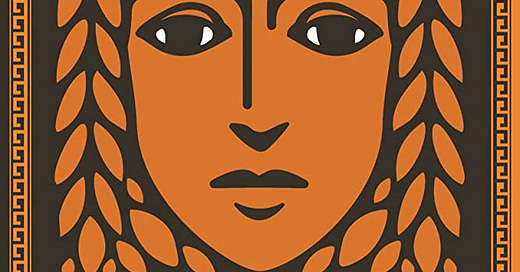Circe by Madeline Miller
Genre: Mythological Retelling
Rating: 5 stars
“It is a common saying that women are delicate creatures, flowers, eggs, anything that may be crushed in a moment’s carelessness. If I had ever believed it, I no longer did.”
Madeline Miller, in her first novel, The Song of Achilles, retold the story of Achilles, the Greek hero, with an emphasis on the love he had for Patroclus, and it went on to win what was then called the Orange Prize for Fiction. When I read the book, the most striking thing that I noticed about Miller’s retelling was her sensitivity and awareness about the gendered inequality in the power play that exists in these mythological stories. That is the central focus of her second novel, Circe, resulting in a beautiful exploration of the position women held in Greek society and the striking similarities to today’s world.
Circe, the eldest daughter of Helios, the sun god and a naiad, is immortal and realises in a fit of love and jealousy that she is a witch with the ability to transform creatures. Helios trades her life in exchange for those of his other kids and strikes a deal with Zeus. Circe is exiled to the island of Aiaia, where she lives alone. Only to be visited by ‘fallen’ naiads, ill-intentioned men, and the mischievous God: Hermes, Odysseus and his men on their way to Ithaca and, subsequently, Odysseus’s wife and son. In this novel, while working with the source material of ‘The Odyssey’, Miller takes the character of the nasty witch and paints us a picture of a fiercely independent woman who is divine and yet relatable.
Miller highlights certain parts of the well-known story to weave a feminist narrative. The manner in which she describes each female character in the novel, whether it is the cruel and manipulative Pasiphaë, the observant Penelope, Helen of Troy or Circe herself, both physically and personality, is brilliant. Through her descriptions of how Greek society perceived the status of women and the inequality that existed, she comments on the way great stories like ‘The Illiad’ and ‘The Odyssey’ have portrayed them. The biggest example of this is the way in which Miller transformed the character of Circe into someone towards whom we are sympathetic. “Humbling women seems to me a chief pastime of poets. As if there can be no story unless we crawl and weep.”
Miller also writes extremely sensitively about motherhood. Circe may be a minor goddess, but she is a goddess nonetheless. Yet, there are passages so beautifully constructed and real about her coping with being a single mother, the anxiety about the child’s well-being, the possessiveness and the inevitable pain of letting go. Similarly, Circe’s search for love comes out in the book naturally as we follow her for hundreds of years on her little island. She finds companionship with Hermes, comfort with Daedalus, passion with Odysseus and then finally finds love that transforms her, both physically and metaphorically, with Telemachus.
While writing about a character trapped on an island alone, for the most part, Miller definitely had her work cut out for her, especially since the book is written from the first-person POV. But what Miller does is weave the stories of Icarus, the Minotaur, Medea, the Trojan War and several others as part of tales told to Circe by Hermes and Odysseus, leaving us enthralled by them just as she is. Hats off to Miller for pulling this off so well! She even references her other book by discussing the fit of madness that Achilles descended into after Patroclus’s death. Her prose is contemporary but still retains some poetic elements from the source material. She touches upon topics like ambition, hubris, jealousy, and love with a lot of political intrigues and a long list of characters. But she didn’t lose my interest for a moment. I cannot end this review without talking about the last chapter of the book. She is truly the sorceress of open endings!
“I thought once that gods are the opposite of death, but I see now they are more dead than anything, for they are unchanging and can hold nothing in their hands.”
This book also has what probably has now become my favourite insult. At one point in the story, Circe calls her father “a harp with only one string, and the note it played was himself.”. I am going to leave you guys with that.



